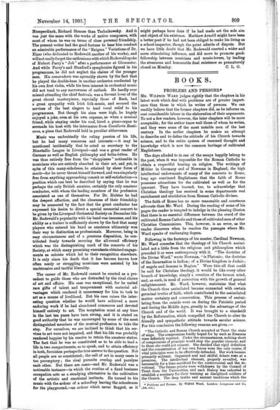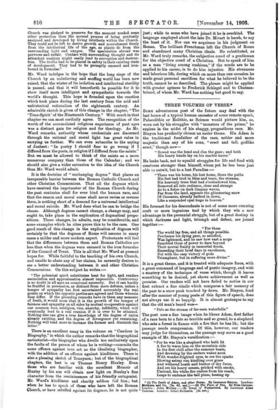BOOKS.
PROBLEMS AND PERSONS.* Ma. WILFRID WARD judges rightly that the chapters in his latest work which deal with problems are of greater import- ance than those in which he writes of persons. We can readily believe that the former chapters did, as he informs us, cost considerable labour in the elaboration of their arguments. To not a few readers, however, the later chapters will be more acceptable ; for the author knew well those of whom he writes, and they were some of the most notable men of the last century. In the earlier chapters he makes an attempt to describe and to define the attitude of his Church towards science, and to the entire system of reasoned thought and knowledge which is now the common heritage of cultivated Englishmen.
The days alluded to in one of the essays happily belong to the past, when it was impossible for the Roman Catholio to obtain a respectful bearing on religion. The writings of Mohler in Germany and of Newman in England, the high intellectual endowments of many of the converts to Rome, long ago convinced Englishmen that the faith of Rome possesses attractions for the cultivated as well as for the ignorant. They have learned, too, to acknowledge that Christian theology has received in some departments real enrichment and elucidation from Roman Catholic divines.
The faith of Rome has no more reasonable and courteous advocate than Mr. Ward. During the reading of some of his pages the reader is tempted to indulge in the pleasing illusion that there is no essential difference between the creed of the cultivated Roman Catholic and those of cultivated men of other Christian Communions. This, however, is an error, as the reader discovers when be reaches the passages where Mr. Ward speaks of unchanging dogma.
Following in the footsteps of his master, Cardinal Newman, Mr. Ward concedes that the theology of his Church assimi- lated not a little from the religions and philosophies which preceded it or were contemporary with it. " The doctrine of the Divine Word," wrote Newman, " is Platonic ; the doctrine of the Incarnation is Indian ; of a Divine kingdom is Judaic ; of angels and demons is Magian." Were this all that could be said for Christian theology, it would be like every other branch of knowledge, simply a creation of the human mind, and, as such, in need of correction with the growth of general
enlightenment. Mr. Ward, however, maintains that what the Church thus assimilated became connected with certain germinal truths of faith, which contributed to the assimilated matter certainty and consecration. This process of assimi-
lating from the outside went on during the Patristic period and during the Middle Ages, greatly to the advantage of the Church and of the world. It was brought to a standstill by the Reformation, which compelled the Church to alter its friendly and sympathetic attitude towards secular science. For this conclusion the following reasons are given :—
" The Catholic and Roman Church accepted at Trent the state of siege. The compromises fondly hoped for by such as Erasmus were definitely rejected. Under the circumstances, nothing short of compromises of principle would stop the popular clamour, and to these she could not consent. She decided that rigid definition and the concentration of her own forces were the only course, if vital principles were to be effectively defended. Her work became primarily militant. Organised zeal and skilful debate were at a premium. The intellectual element, properly so-called, was necessarily for a time sacrificed for the controversial and the de- votional. The future priests were withdrawn by the Council of Trent from the Universities, and each Bishop was exhorted to establish a seminary for their training as disciplined soldiers of the Church. The deep truths and ancient traditions which the • Problems and Persons. By Wilfrid Ward. London: Longman and Co, 1.146. net. j Church was pledged to preserve for the moment needed some other protection than the normal process of being gradually analysed and developed by living intellects within the Church. They could not be left to derive growth and nourishment freely from the intellectual life of the age, as plants do from the surrounding light and oxygen. The speculation abroad was perverse and unfair. Contact with surrounding thought and its attendant analysis might easily lead to corruption and destruc- tion. The truths had to be placed in safety in their existing state of development. They had to be promptly encased and iron- bound in formulae."
Mr. Ward indulges in the hotie that the long siege of the Church by an unbelieving and scoffing world has been now raised, that the winter of its isolation and intellectual sterility is passed, and that it will henceforth be possible for it to show itself more intelligent and sympathetic towards the world's thought. This hope is founded upon the reaction which took place during the last century from the arid and unhistorical rationalism of the eighteenth century. An admirable sketch is given of this change in the chapter, " The Time-Spirit' of the Nineteenth Century." With much in that chapter we can most cordially agree. The recognition of the worth of the accumulated religious experience of past ages was a distinct gain for religion and for theology. As Mr. Ward remarks, authority whose credentials are discerned through the rational and moral light has great value in carrying us further. We can even subscribe to the saying of Joubert " In poetry I should fear to go wrong if I differed from the poets, in religion if I differed from the saints." But-we-must be allowed to think of the saints as a more numerous company than those of the Calendar ; and we should also give a wider extension to the idea of the Church than Mr. Ward would admit.
It is the doctrine of "unchanging dogma" that places an insuperable barrier between the Roman. Catholic Church and other Christian Communions. That all the dogmas which have received the imprimatur of the Roman Church during the past centuries shall for ever bind the human race, and that the reason and moral sense shall never revise or reverse them, is nothing short of a demand for a universal intellectual and moral suicide. Mr. Ward does what he can to bridge the chasm. Although dogmas cannot change, a change may, and ought to, take place in the explication of dogmatical propo- sitions. These changes, he admits, may be considerable, and some examples which he cites prove this to be the case. One good result of this change in the explication of dOgmas will certainly be that the dogmas of Rome will assume in many cases a milder and more modern aspect. Protestants will feel that the differences between them and Roman Catholics are less than when the dogmas were encased in the iron formulae of the Council of Trent. This is all that Mr. Ward at present hopes for. While faithful to the teaching of his own Church, and unable to abate any of her claims, he earnestly desires to see a better understanding between it and other Christian Communions. On this subject he writes :—
" The polemical spirit substitutes heat for light, and renders assimilation and approximation almost impossible. Controversy is no doubt in all ages an occasional necessity. But it can hardly be fruitful in persuasion, as distinct from mere defence, unless a temper of sympathy has first ascertained accurately the real points on which the opposite parties are agreed and those wherein they differ. If the preceding remarks have in them any measure of truth, it would seem that it is the growth of the temper of fairness and sympathy on all sides by mutual co-operation against our common foes, irreligion, vice, anarchy, infidelity, which will eventually lead to a real reunion if it is ever to be attained. Nothing else can give a true knowledge of the degree of union already existing, and the degree of divergence yet remaining. Nothing will tend more to increase the former and diminish the latter."
There is an excellent essay in the volume on " Candour in Biography," in which the author remarks that the biographical caricaturist—the biographer who dwells too exclusively upon the faults of the person of whom he is writing—commits the same offence against true art as the idealising biographer, with the addition of an offence against kindliness. There is also a pleasing sketch of Tennyson; but of the biographical chapters, the best is on Thomas Henry Huxley. Even those who are familiar with the excellent Memoir of Huxley by his son will obtain new light on Hnxley's fine character from the reminiscences of his friendly antagonist. Mr. Ward's kindliness and charity seldom fail him ; but when be has to speak of those who have left the Roman church, or have rebelled against its dogmas, be is not quite
just ; while to some who have joined it he is overkind. The language employed about the late Dr. Mivart is harsh, to say the least of it. Nor can we acquiesce in his judgment on Renan. The brilliant Frenchman left the Church of Rome and abandoned many Christian ideals. He substituted, as Mr. Ward truly remarks, the subjective creed of a gentleman for the objective creed of a Christian. But to speak of him as a man " living among 'cushions," if the words are to be applied to his career, is to do him injustice. His strenuous and laborious life, during which on more than one occasion he made great personal sacrifices for what he believed to be the truth, cannot be so described. The phrase might be applied with greater aptness to Frederick Schlegel and to Chateau- briand, of whom Mr. Ward has nothing but good to say.















































 Previous page
Previous page